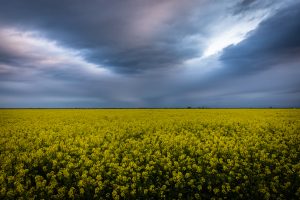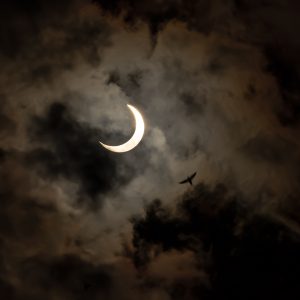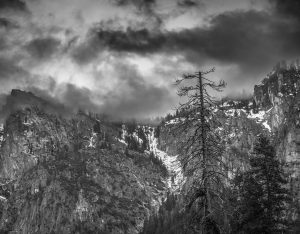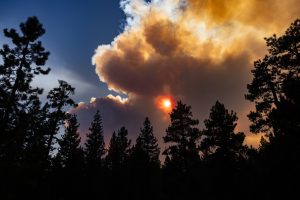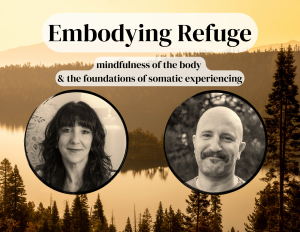I cried myself awake this morning. This has happened more often that I care to admit during the past number of months. It has been a challenging year. I need not name the reasons. This morning, however, my sadness came following my sleep’s digestion of the news of RBG’s passing. Last night, it had been fear.
In August, I took a ten-day silent retreat at home. The first half was on my own and, for the second half, I joined a five-day Zoom retreat with my teacher.
I started each day with the traditional chanting of metta bhavana, the cultivation of lovingkindness – wishing well for all beings. I ended each day with the same thing. In between these chants for lovingkindness, I spent between fourteen and sixteen hours alternating between sitting and walking mediation. Of course, there were eating and showering and taking out the trash meditations – this is what happens on a home retreat. Sometimes, I had to engage in playing with the cats meditation, which, as time went on, became a remarkably tender hour of the day.
One evening towards the end of the retreat, my teacher guided the yogis through a powerful metta meditation, during which I sat very intimately with the warm sensation of love that had developed in the center of my chest. Like a sun blazing gently in my heart, it permeated the entirety of my body, transforming it, for the time being, into a refuge for all beings.
The following morning, I slept in until four-thirty, about an hour past my usual time for waking up. I don’t remember what part of my tardy waking up inspired it, but I decided to forego my usual metta chanting and read a poem from “The First Free Women”. I read, out loud, “Blue Lotus”.
The poem tells the story of a nun who left home following abuse at the hands of her father only to find herself confronted by a would-be attacker while she was meditating in the forest.
I turned around.
He looked just like my father
…
I looked into his eyes
And saw the billion lifetimes
That he and I
Had been running around
This same circle
Together.
–
Then I walked
All the way down
To the darkest parts
Of my own mind —
And stood in front of
The blazing roar
As countless
Lifetimes
Of fear
And revenge
Threw themselves
Into the furnace.
–
Burn with me, my sisters.
from “The first free women”, translation by matty weingast
As I read the poem, I started to get a sense of the weight of the world, the scope of suffering that abounds within it, and the many eons that humans have traded harmfulness amongst each other – a harmfulness that we inherit and, in many ways, perpetuate on a day to day basis. The weight of this inheritance and my complicity in it started to overcome me. The proverbial dam broke when I read the lines:
We have all wounded.
We have all been made to feel weak
–
Yes.
There is great strength in the darkness.
–
Yes.
The mind can be used as a knife —
Or as a chain.
–
Yes.
Your whole world
Is burning
Itself
To the
Ground.
FROM “THE FIRST FREE WOMEN”, TRANSLATION BY MATTY WEINGAST
And I started weeping. Nearly uncontrollably. Being that this was retreat and I wasn’t supposed to just let myself get lost in whatever happened to come up, I brought mindfulness to the fore.
What emotion was I experiencing? Grief. Grief for all beings. Grief for the mindless ways that we continue to inflict harm upon one another.
Where did I feel grief? My torso. My neck. My face. My arms and legs seemed to be unaffected.
What did I feel? This is where things got interesting. As an overall sensation, grief was generally unpleasant and characterized by tension. I think a lot of the time, I would just stop there – note it is as unpleasant, note the tension, and then move on. But I recalled prior work I’d done with anxiety and decided that the overall sensation wasn’t good enough. It needed to be broken down into its components.
Where, specifically, did I feel the tension? My eyes. From trying to hold back tears. My face. From trying to prevent it from contorting into ugly face. My neck and shoulders. From helping my face stay resolute and trying to keep my head from giving in to the weeping. My lower abdomen. From trying to my keep breath from giving in to the weeping.
And that’s when I noticed it. That’s when I noticed that by looking for tension I had inadvertently skipped the entire middle of my chest. That’s when I saw the warmth blazing forth from my heart. That’s when I saw the love at the center of my grief.
But the love was not radiating as it had the night before. It was caged in, as it was, prevented from permeating beyond my chest by the tension below it, in my abdomen, and above it, in my neck, shoulders, and face. My grief was none other than love that I was trying to forcefully suppress. Love that I didn’t want to feel. Love that was so great it felt too dangerous to allow out.
Seeing the tension and seeing its purpose, like many forms of noticing during practice, naturally led to its lessening. Gradually, the tension relieved itself and the warmth in my chest was allowed to permeate my body as it had during the metta meditation the night before. There was no longer any need to note grief, because I wasn’t grieving any longer.
I finished reading the poem:
“Ask yourself what
You are really
Prepared
To give up
In order to be free.”
FROM “THE FIRST FREE WOMEN”, TRANSLATION BY MATTY WEINGAST
The beauty of the insights found during practice is not that they completely eliminate an obstacle from our paths going forward. I realize there may come a point at which this happens as well, but that hasn’t been my experience. Instead, the beauty is that these insights shine a light on the path, making its navigation more manageable.
So, when I cry myself awake with grief as I did this morning, I didn’t need to have nine days of prior meditation in order to see it clearly. I just needed to remember. I took note of the tension and looked toward the center – there it was, love for the world, blazing.
Burn with me, my sisters. There is work to be done.
